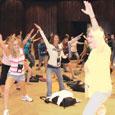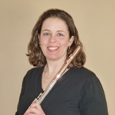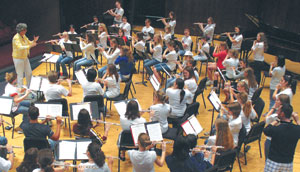
For the past 32 years, Katherine Borst Jones, flute professor at The Ohio State University, has gathered high school flutists for an annual summer High School Flute Workshop. The Workshop attracts students from Ohio and neighboring states, although players have attended from across the country. Similar to other college flute camps, the workshop enriches flutists’ musicianship while giving them a taste of college life. Students stay in the school’s residence halls and dine both on campus and at local restaurants on High Street.
What makes this flute camp different from others is that current O.S.U. flute students coach the high school campers in their small ensembles, and graduate students gain valuable student teaching experience by teaching some of the private lessons. Many Ohio State flute majors are alums of the Flute Workshop.
Jones finds that the Flute Workshop helps her university flute studio. “The workshop has served as a wonderful recruiting tool for my studio, but also for the school. Students experience college life while getting to know the professor and graduate and undergraduate students in the studio. They get a sense of the studio environment, as well as for the music facilities. Only a small number of students major in music, but many want to continue playing their flute in college.
“The workshop serves as an orientation for incoming freshmen and as a student teaching experience for my flute majors. I find that when college freshman help as coaches, they gain maturity for the second year of college. I am always looking for practical experiences for my college students.”
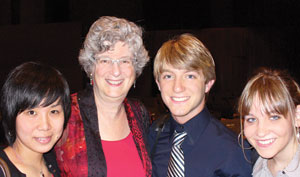
Flute major Lauren Slemenda says that “Working at flute camp has helped me discover a passion for teaching that I never knew I had. The enthusiasm of the students reminded me of my own love for the flute and renewed my excitement about music.”
The program is a comprehensive music experience with a focus on flute. Jones says that the original schedule was oriented more toward a clinic format. “My concept was that chamber music (flute ensembles, trios, and quartets, for example) should be at the heart of the workshop. From the very beginning, we formed chamber groups coached twice a day by faculty and college students. .jpg)
“Private lessons have also always been an integral part of the workshop. For the first nine years, I had corporate support that allowed me to engage an outside professional flutist to play a recital and do masterclasses. Mark Thomas was the first. Others included Robert Cole, James Pellerite, and Karl Kraber.” Today, Jones serves as the resident professional.
The Schedule
Flute Workshop opens with a recital by Jones, who chooses works that students may know from their own studies, as well as pieces in various styles and representative of different eras. This gives students the opportunity to hear an excellent performance while observing proper stage presence and learning audience etiquette. She presents daily master classes as well.
Following breakfast each day there are morning warmups to prevent injury and cement proper playing technique. Jones’ warmups are educational and fun and warm up the body while helping students wake up. Full body movement prepares players for a full day of music. Flute warmups follow, starting with the headjoint, then adding the flute body, and finally playing long tones, scales, and other technical patterns from memory.
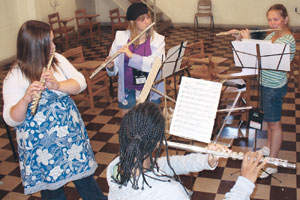 Following the warmup session, students rotate through a masterclass with Jones, a theory class, and chamber ensembles. Phil Stoecker, a Flute Workshop and O.S.U. alum who currently teaches music theory at Hofstra University on Long Island, New York, teaches the theory classes. His classes are challenging to teach because participants have varying degrees of prior music theory training.
Following the warmup session, students rotate through a masterclass with Jones, a theory class, and chamber ensembles. Phil Stoecker, a Flute Workshop and O.S.U. alum who currently teaches music theory at Hofstra University on Long Island, New York, teaches the theory classes. His classes are challenging to teach because participants have varying degrees of prior music theory training.
For chamber music, students are assigned to flute trios, quartets, and quintets, based on informal auditions held when they arrive at camp. Each ensemble is named for a famous flutist, such as James Galway, Renee Siebert, or Jean-Pierre Rampal. Students are encouraged to learn as much as they can about their ensemble’s namesake.
Each ensemble is coached by either a college flute major or Jones, and the groups rehearse twice a day every day. During scheduled chamber music times, ensembles sightread music for their instrumentation, select a piece, and prepare it for performance at the closing concert. They also practice performance skills, such as entering and exiting the stage, performing without a conductor, and bowing.
After lunch, all students and counselors participate in a flute choir rehearsal. Special opportunities are available for interested students to play piccolo, alto, or bass flute in this large ensemble. Counselors stand behind the seated campers and play along, serving as models of good tone, technique, and musicality.
In 2008 jazz flutist Kris Keith guest-conducted the flute choir for a performance of his original composition, Cute. He also brought a rhythm section to accompany the flute choir for this jazzy work.
Afternoons are filled with elective opportunities for students, and they may choose to participate based on their own individual interests. All students receive one private lesson with either Jones or a graduate flute major. Recent electives have included special sessions on instrument repair, playing duets, checking pitches with a tuner and tuning chart, working with SmartMusic software, experimenting with alto and bass flutes, and extra lessons. Catherine Hope-Cunningham, the Admissions Coordinator for the School of Music, also led a special question-and-answer session about the admission process at O.S.U. and general admission information relevant to any college or university. Following dinner, campers have an evening chamber music rehearsal, followed by a special event. These may include listening to the college students perform, skits, and even a candid conversation between high school and college students about college life.
On the final evening participants perform in a formal solo recital followed by a pizza party and quiz game with prizes that cover information learned throughout the workshop. The following day the workshop ends with a closing concert after lunch, in which each chamber ensemble performs and the large flute choir plays.
The value of attending a summer flute camp cannot be denied. Find one in your area and discover the benefits of mingling with students from other schools and private teachers with new perspectives on music and the flute. You will discover music you didn’t know about, gain a sense of your playing level as it relates to others, and make contacts that may last a lifetime.
(For more information on The Ohio State University High School Flute Workshop see http://music.osu.edu/2_news_events/camps/flute_workshop.php, jones.6@osu.edu, 614-292-4618)
